In 1881, with the retirement of Radcliffe from teaching, an amalgamation with the Church of England High School was arranged.
In December 1882 Kingston was devastated by its worst fire ever in the commercial district.
The amalgamation of the two schools was not a success and was ended in 1886. William Morrison then established his own school - the Kingston Collegiate School - which carried on the tradition successfully until his death in 1902.

1880-1: final year of the 'Old Collegiate'
In 1881 John Radcliffe finally retired from teaching, and the school he had founded in 1853 passed into the control of others after nearly thirty years. However his influence still affected the school over the latter twenty years of its existence.
Daily Gleaner, January 15 1880
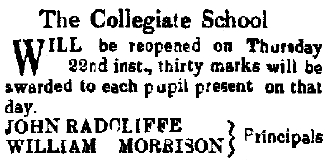
Daily Gleaner, July 23 1880
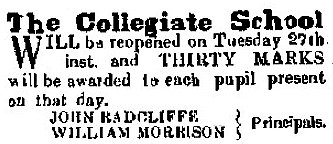
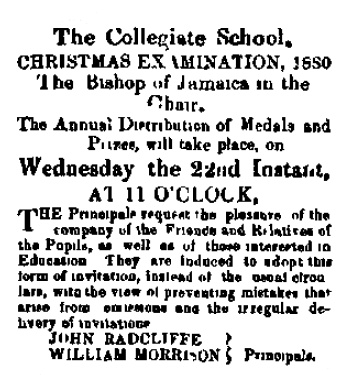

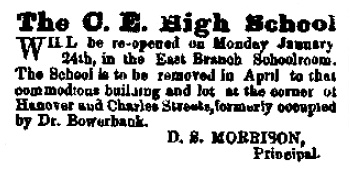
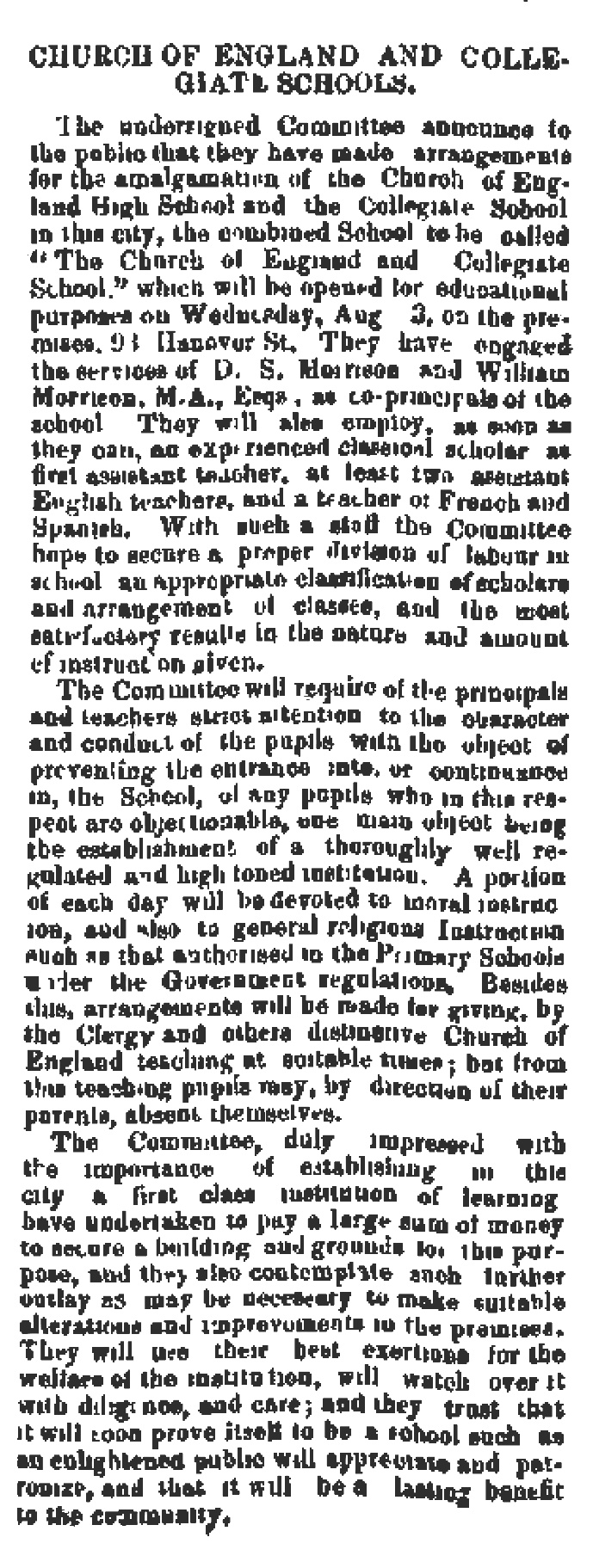
It is said that the arrangements by which the Church of England High School and the Collegiate School will be welded together in one large educational establishment, progress favourably, and that Kingston will soon be able to boast of a College the equal of any of its kind in the West Indies. Probably public curiosity will soon be gratified as to the details of the scheme and the negotiations,
THE CHURCH OF ENGLAND AND COLLEGIATE SCHOOLS.
We publish to-day an important statement - for which readers of the "Gleaner” are not unprepared, as reference to the subject has already been made in these columns with regard to the amalgamation of the Church of England and the Collegiate Schools of this city.
It is with great pleasure that we hail the early opening of the new school,
which promises to be, under its Committee and its Co-Principals, one of the
leading educational institutions of the Island and a credit to Kingston. More
than once we have written lately in behalf of higher education for the boys of
this Island, and for the girls also; and we can only hope that this move in the
right direction may be attended with such success as to lead to attempts
being made to improve the education of the girls, so that without
undertaking the expenses of a trip to, and residence in, England, they may
be fitted to shine in their respective stations of life here.
The school has two able and excellent Principals, who will be assisted by carefully selected tutors. The situation of the school could not be better, the premises in Hanover Street are admirably suited to the purpose, and the
playing fields are large. We notice the Committee state that arrangements will
be made for the reception of boarders by one of the Principals, and the
School will thus be available to parents living in the country.
The new school will be, it appears, directly controlled by the Committee. We
understand that the gentlemen forming the Committee, and others, may, so
far as necessary, guarantee the payment of the expenses incurred in
establishing the school, but they will not profit pecuniarily by its success,
their concern being to secure to the public its advantages. We echo the hope “that it will soon prove itself to be a school such as an enlightened public
will appreciate and patronise, and that it will be a lasting benefit to the
community."
The amalgamation of the Schools is the result, it we may so put it, of the
formal retirement of the Rev. Mr. Radcliffe, from the work of education of the
young. He has no connection with the new school, and ceases to teach
with its opening, Mr. Radcliffe has done great service to this Island as a
schoolmaster, and there are many who will share with us a profound regret
at learning that he gives up work for which he had so many eminent
qualifications and in which he has won many eminent successes.

In 1882 the Cambridge Local Examinations were administered for the first time in Jamaica. Pupils from the Church of England and Collegiate School sat the exams, and did well, in spite of the unfortunate coincidence that December 11th, when the exams started, was the day on which much of the commercial area of Kingston was destroyed by the terrible fire known as Feurtado's Fire, because it began in Feurtado's lumber yard on Harbour Street. This fire was Kingston's worst disaster before the earthquake of January 14, 1907
Daily Gleaner, April 23, 1883
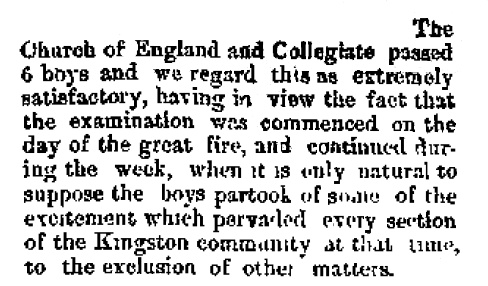

[editorial]
Our attention has been directed to the course pursued by the managers of the
Church of England and Collegiate School in educating the youth committed to
their care, and we have heard with regret that in not a few instances parents
were displeased at the want of progress exhibited by their sons; so much so,
indeed, that they have removed them to other institutions. The school under
consideration was started under the most favorable auspices. It was intended
to supply the want, long felt in this community, of a school at which a thorough
English commercial education would be given as well as a classical course; the
principal chosen for the school, Mr. MORRISON, had for years been favorably
known here both as a finished scholar and a successful tutor; the buildings
were well adapted for the purpose, and the fact that the trustees were presided
over by a gentleman of the scholarly, attainments of His LORDSHIP THE
BISHOP OF JAMAICA induced the people to believe that their sons would
acquire such an education in that institution as would enable them hold their
own, at least, with the pupils of kindred institutions, such as York Castle High
School. The result of the matriculation examinations for the Gilchrist and
Jamaica Scholarships, however, is somewhat disheartening, for it shows that
while two pupils of York Castle High School secured second and third places
in the honors division, (so far as the West Indies is concerned) to one of whom
was awarded the Jamaica Scholarship, the Church of England and Collegiate
School was nowhere. But we learn with much surprise that in the said school
the more important branches of an English education are sacrificed for
classics, a mistake which, we think, should be rectified promptly, otherwise the
school will wane in its usefulness and fail to fulfil the object for which it was established; for obviously the majority of the boys attending that school will eventually follow commercial pursuits, in which a thorough English education
will prove of vastly more importance than classics.
Strange as it may appear, the attention of His LORDSHIP THE BISHOP has been directed to this subject and he declines to interfere, but in view of an effort
which we understand is being made by the residents of St. Andrew to have the
Barbican High School opened for day scholars, we think the trustees will do
well to carefully look into the management of the school and place it beyond the
pale of just criticism. The following from the "Jamaica Gazette," tells its own
story:-
The governor directs the publication, for general information, of the
accompanying pass list and extract from a letter from the Registrar of the
University of London, stating the results of the matriculation examination held
in January last, which is the standard for the award of the Gilchrist Scholarship
in the West Indies and the Jamaica Scholarship.
2. As a consequence of the result of this examination the Jamaica Scholarship
has been awarded to Mr. David Dias Parnther, of York Castle High School.
WEST INDIES.
(Honours Division.)
Falconer, Robert Alexander, Queen's College, Trinidad.
Parnther, David Dias, York Castle High School.
Lockett, George Vernon, York Castle High School, Jamaica.
(First Division.)
Nash, Aurnias Henry, Harrison College, Barbados.
Reece, Henry Walter, Harrison College, Barbados.
Wilson, Alfred Garraway, Harrison College, Barbados.
(Second Division.)
Griffith, Francis William, Harrison College, Barbados.
Extract from a letter from the University of London to the Colonial Office,
dated 11th April 1885
3. In the West Indies eight candidates presented themselves - two in
Jamaica, five in Barbados, and one in Trinidad. Of these eight one (No 979) has
failed, being rejected by the examiners in every subject but French.
Of the rest, three have passed in the honours division, viz No. 993, Mr. H. A.
Falconer, No. 1188, Mr. D. D Parnther and No. 887, Mr. G V. Lockett; three in the
first division, viz., (No. 975, Mr H. G Wilson, No. 997, Mr A. H Nash, and No. 978,
Mr H. W. Reece); and one in the second division viz., No 970, Mr. F. W. Griffith.
The marks obtained by Mr. Falconer place him next to the 1st; those obtained
by Mr. Parnther place him equal with the 10th; and those obtained by Mr.
Lockett place him equal with the 55th in the original honours list. It is to be
assumed, therefore, that the Gilchrist Scholarship assigned to the West Indies
will be awarded to Mr. Falconer, of Queen's College, Trinidad; but with this
award the University has nothing to do, I will, however, communicate the
result of the examination to the Secretary of the Gilchrist Trust, who will no
doubt officially notify the award.
Daily Gleaner, November 3, 1886
The Church of England and Collegiate School has collapsed. Peace to its
ashes! It would have long since failed but for the generous assistance
rendered by HENRY LIVINGSTON, Esq., towards it. Its failure was well-
merited. No one who knew the workings of the institution could hope
anything else but failure for it. There were too many cooks and they spoiled
the broth. Months ago, on becoming acquainted with the curriculum
pursued in the school, we foretold the fate that has now befallen it. The
BISHOP would not condescend to hear a suggestion from any quarter. He knew all about conducting the School and he cannot but now feel fluttered
by his success. The Collegiate School would have children run before they
had learned to walk; it would have boys talk Greek before they could write
English. It was intended, no doubt, to make the Church of England
Collegiate School of Kingston a pocket edition of Oxford, England. How far his Lordship the Bishop, and those associated with him succeeded, the
history of the last five years attests. And how could it have been
otherwise than a failure! It is hardly ever safe to take the hammer out of the
mason's hand. Had the BISHOP and the Committee in charge of the School
permitted Mr. WILLIAM MORRISON to manage it according to his own ideas instead of forcing their impractical suggestions upon him, the Collegiate
School would have proved a blessing to the youth of Jamaica.
Mr MORRISON intends opening, in January, a Collegiate School, on his own
account. That he will succeed we are certain. His finished education, his long
experience as a teacher, his rare good sense, and the record of his past service, to which very many young men now filling important positions in
Jamaica and elsewhere can point with pride and pleasure, lead us to believe
that he will succeed in his new undertaking. This is our wish, at least, and we
are sure that hundreds of our fellow citizens will join us in wishing Mr.
WILLIAM MORRISON the largest measure of success and prosperity.
“The King is dead: long live the King.”
______________________________________________________
In the second half of 1886 William Morrison re-started the Collegiate School under his own management, clearly intending to continue the educational tradition started by John Radcliffe in 1853.
The Church of England continued its side of the divided institution as

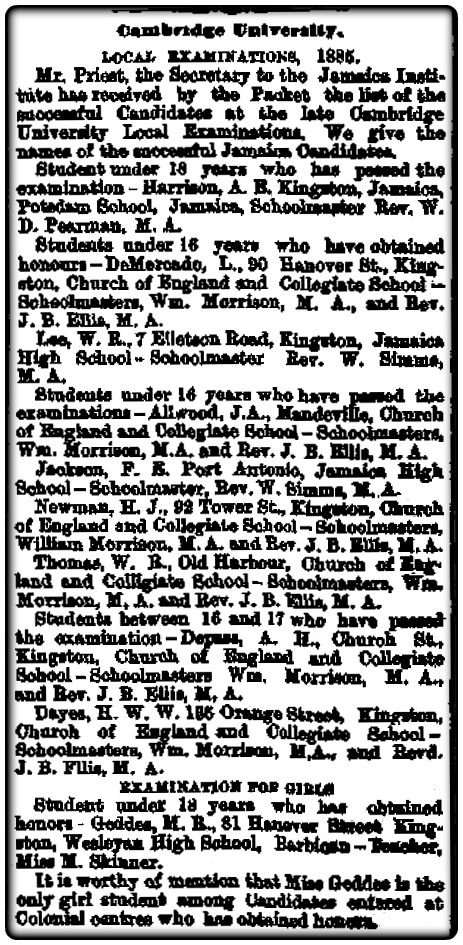


Daily Gleaner, March 18,
1889
[at a big political meeting in Kingston William Morrison made this interesting claim]
'As respects State aid to schools, he had conducted the Collegiate for many years and had now fifteen boys - three of them black - entered at the Universities in Great Britain, and he never asked or received a penny from the Government.'
Now some research needs to be done to attempt to identify the three Black students referred to by Morrison; at this point the earliest Black student in the UK from the Collegiate that I have identified was Hector Joseph who won the Jamaica Scholarship in 1891 and went to Trinity Hall, Cambridge.
